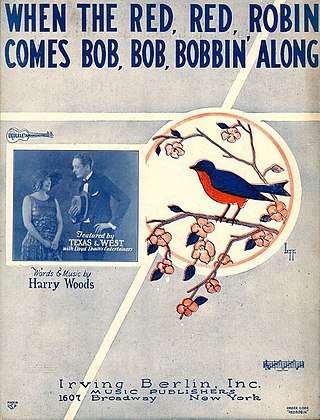Sisters is a popular song written by Irving Berlin in 1954, best known from the 1954 film White Christmas.
"If I Give My Heart to You" is a popular song written by Jimmy Brewster, Jimmie Crane, and Al Jacobs. The most popular versions of the song were recorded by Doris Day and by Denise Lor; both charted in 1954.
"Hey There" is a show tune from the musical play The Pajama Game, written by Richard Adler and Jerry Ross. It was published in 1954. It was introduced by John Raitt in the original production. In the show, Sid sings it to a recording device, telling himself that he's foolish to continue his advances to Babe. He plays the tape back, and after responding to his own comments, sings a duet with himself.
"In the Cool, Cool, Cool of the Evening" is a popular song with music by Hoagy Carmichael (1899-1981), and lyrics by Johnny Mercer (1909-1976). It was originally planned to feature it in a Paramount Pictures film written for Betty Hutton (1921-2007), that never took off, which was to be called The Mack Sennett Girl. The song was buried in Paramount's files until it was rediscovered and then used in the 1951 film Here Comes the Groom and won the Academy Award for Best Original Song.
"I Get Ideas" is a popular song which has been recorded by various musicians and used in a number of films and television episodes.
"P.S. I Love You" is a popular song with music by Gordon Jenkins and lyrics by Johnny Mercer. published in 1934.
"Heat Wave" is a popular song written by Irving Berlin for the 1933 musical As Thousands Cheer, and introduced in the show by Ethel Waters.
"Out of This World" is an American popular song composed by Harold Arlen, with lyrics written by Johnny Mercer. It was first recorded by Jo Stafford with Paul Weston and his Orchestra in 1944.

"A Fine Romance" is a popular song composed by Jerome Kern with lyrics by Dorothy Fields, published in 1936.
"Pennies from Heaven" is a 1936 American popular song with music by Arthur Johnston and lyrics by Johnny Burke. It was introduced by Bing Crosby with Georgie Stoll and his Orchestra in the 1936 film of the same name.
"The One I Love (Belongs to Somebody Else)" is a popular song composed by Isham Jones with lyrics by Gus Kahn. The song was recorded by Isham Jones' Orchestra on December 21, 1923, at Brunswick Studios in New York City, and published on January 7, 1924. On January 17 in Chicago, Jones recorded another version, with Al Jolson on lead vocals. Both versions made the charts that Spring, with Jolson's peaking at number 2, and Jones' at number 5. Sophie Tucker recorded her version February 1924, released on Okeh 40054.
"Don't Take Your Love from Me" is a popular song written by Henry Nemo and published in 1941. Mildred Bailey first recorded this song in 1940 before publication. It was introduced that year by singer Joan Brooks.

"Somebody Loves Me" is a popular song, with music written by George Gershwin, and lyrics by Ballard MacDonald and Buddy DeSylva. The song was published in 1924 and featured in George White's Scandals of 1924.
"Sunday, Monday or Always" is a 1943 popular song with music by Jimmy Van Heusen and lyrics by Johnny Burke.
"Street of Dreams" is a song and foxtrot composed in 1932 by Victor Young, with lyrics by Sam M. Lewis. There were three successful recordings of the song in 1933 by Guy Lombardo, Ben Selvin and Bing Crosby.
"I've Got a Crush on You" is a song composed by George Gershwin, with lyrics by Ira Gershwin. It is unique among Gershwin compositions in that it was used for two different Broadway productions: Treasure Girl (1928), when it was introduced by Clifton Webb and Mary Hay, and Strike Up the Band (1930), when it was sung by Doris Carson and Gordon Smith. It was later included in the tribute musical Nice Work If You Can Get It (2012), in which it was sung by Jennifer Laura Thompson. When covered by Frank Sinatra he was a part of Columbia Records.
"Isn't This a Lovely Day?" is a popular song written by Irving Berlin for the 1935 film Top Hat, where it was introduced by Fred Astaire in the scene where his and Ginger Rogers' characters are caught in a gazebo during a rainstorm. The lyric is an example of a song which turns a bad situation into a love song, a common style for Irving Berlin, as in "I've Got My Love to Keep Me Warm" and "Let's Have Another Cup of Coffee".
"Just a Little Lovin' (Will Go a Long Way)" is a 1948 song written by Eddy Arnold and Zeke Clements. Eddy Arnold's recording of the song was his fifth number one in a row on the Folk Records chart, spending four non consecutive weeks on the Best Seller chart with a peak position of No. 13.
"Walking the Floor Over You" is a country music song written by Ernest Tubb, recorded on April 26, 1941 in Fort Worth, Texas, and released in the United States that year.

"When the Red, Red Robin " is a popular song written, both words and music, by Harry Woods in 1926. The song became the signature song for singer and actress Lillian Roth, who performed it often during the height of her musical career from the late 1920s to the late 1930s.


